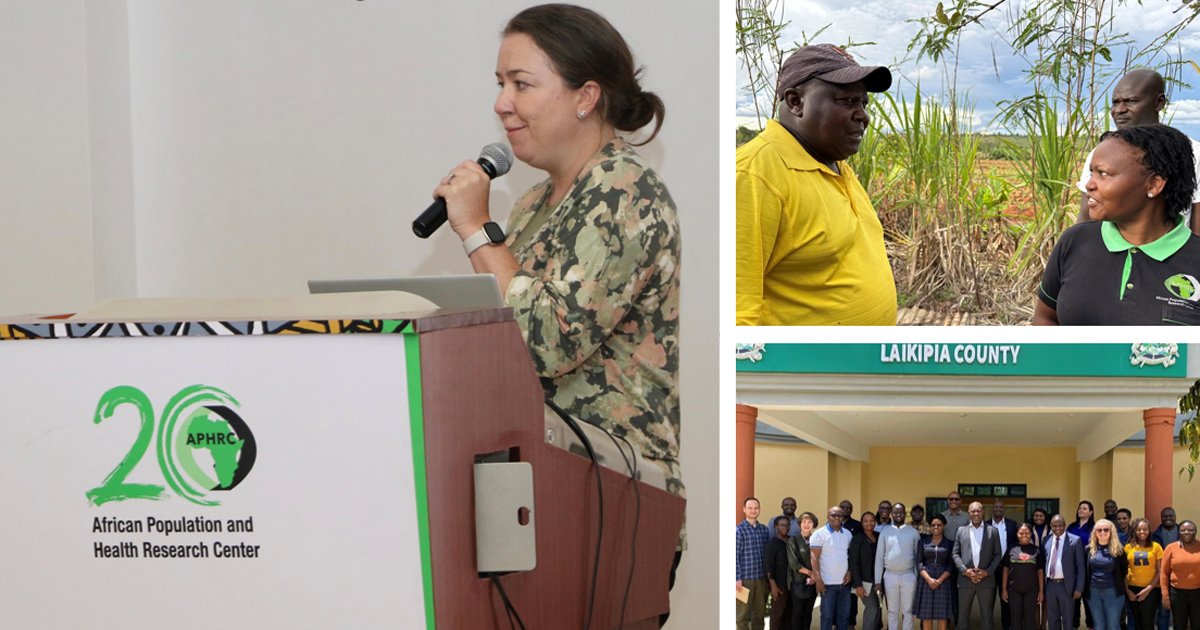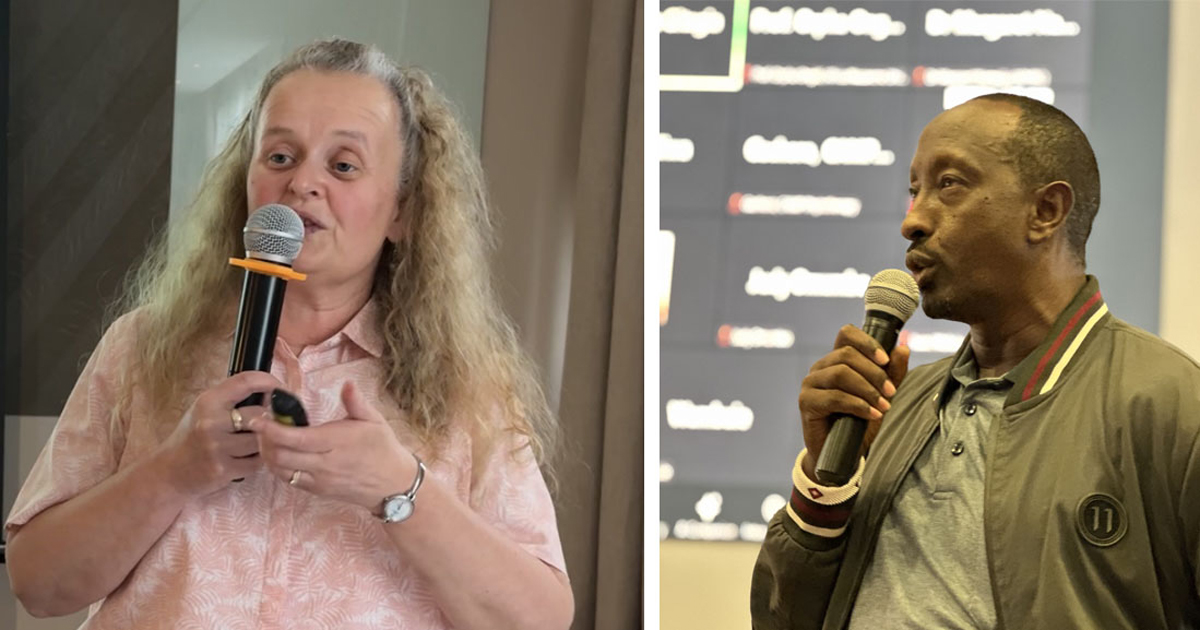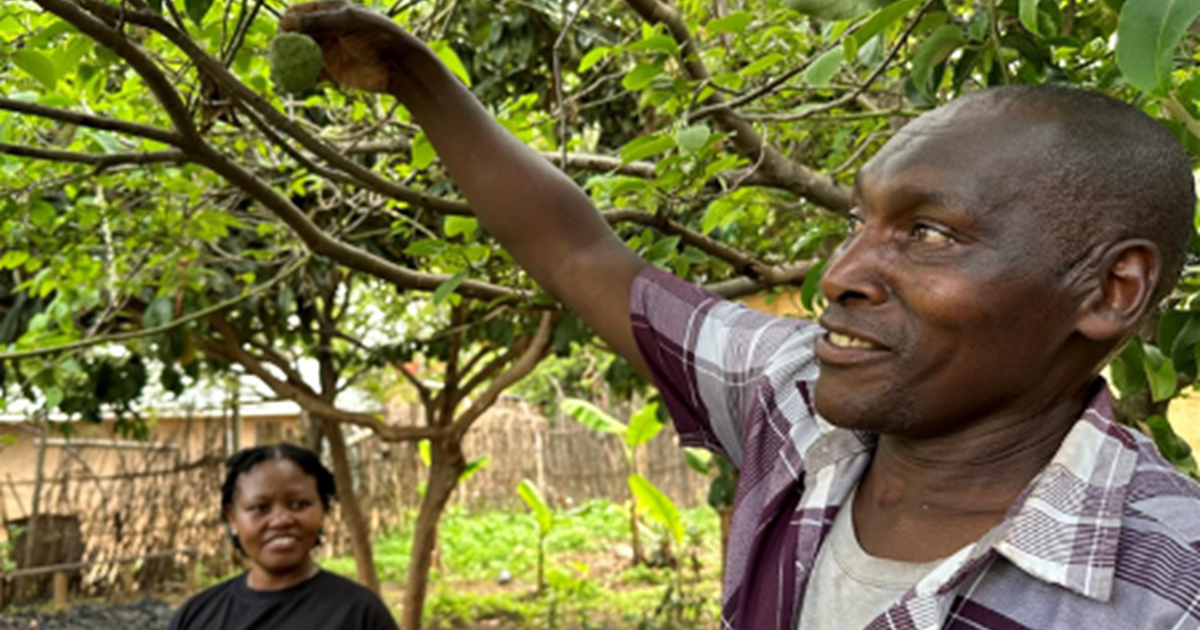
As participants dodged floods to arrive at the launch of a new project, the climate crisis had never seemed so real. From 2020 to 2023, the worst drought in East Africa since the 1980s brought water rationing to Nairobi and untold hunger and suffering to people in the region’s drylands. Now, in May 2024, abnormal rainfall was bursting dams, taking lives in slums and villages, and submerging affluent housing estates.
“The past two weeks have shown that all of us are vulnerable,” said Michael Okumu, the national government’s deputy director of climate change negotiations and finance. “We are now seeing what climate change is. Schools are closed, affecting cognitive development,” said another attendee. “This is threatening Kenya’s ability to achieve the SDG on zero hunger by 2030,” said a third.
The event marked the launch of Making Visible the Impacts of Climate Change Impacts on Food Systems, Nutrition, and Mental Health (Visibilize). Led by the African Population and Health Research Center (APHRC), the three-year project is CIFOR-ICRAF’s first that explicitly focuses on health, and its first funded by global charitable foundation Wellcome.
CIFOR-ICRAF’s expertise in soil, trees, water, farming, climate change, and biodiversity will complement APHRC’s in nutrition, epidemiology, food systems, child and mental health, and health economics.
The aim of Visibilize is to make visible the impact of climate change on the nutritional status and mental health of vulnerable populations in the East African drylands, and catalyze climate policy and practice at scale. Other partners are Kenya’s Ministry of Health, Ministry of Environment, Climate Change and Forestry, Ministry of Agriculture and Livestock Development; county governments of Laikipia, Turkana and Samburu; London School of Hygiene and Tropical Medicine (LSHTM), Oxford University and Loughborough University; Mekelle University in Ethiopia, Makerere University in Uganda, Sokoine Agricultural University in Tanzania and University of Nairobi in Kenya; and agroecology advocacy NGO Participatory Ecological Land Use Management (PELUM) Kenya.

The project marks a coming-of-age of the notion that trees are crucial to human health.
“Besides ecosystem services, trees directly provide crucial ingredients like fruit, leaves and nuts for local cuisines, fodder for the livestock that produce animal-source foods, fuel to boil safe water and cook food so nutrients become bioavailable, and shade against heat,” said CIFOR-ICRAF researcher Stepha McMullin, who works on dietary diversity from agrobiodiversity and wild foods and leads a major project component.
The social scientist, who coined the concept of ‘food tree portfolios’, said further: “In local food systems, fruit and vegetables are seasonal, and indigenous trees have a special role to play. During peak food insecurity, they can plug back into the system key micronutrients such as vitamins A and C, folate, iron and zinc. These tend to be very low in staple-based diets and are of public health concern, especially for women and children, who are often the most nutritionally vulnerable.”

The project will take historical, meteorological, nutritional, and ecological data in Kenya, Ethiopia, Tanzania and Uganda and use models “to understand how climate change has affected nutrition and health in the past and create scenarios of the future,” said LSHTM research fellow Tony Carr. In addition, Kenyan counties Laikipia, Samburu and Turkana, which lie along a climatic gradient from dry sub-humid to semi-arid to arid, will benefit from ecosystem restoration agroecology and agroforestry.
CIFOR-ICRAF and the University of Nairobi will co-lead on land health, surveying rangeland soil, trees and grasses. For public and policy engagement, APHRC and PELUM Kenya will deliver through knowledge translation tools such as briefs, popular media articles, animated video clips, community radio, and CIFOR-ICRAF via its Stakeholder Approach to Risk-Informed and Evidence-Based Decision Making (SHARED).

Visibilize is the brainchild of APHRC senior research scientist Elizabeth Kimani-Murage, who will be the project’s principal investigator. As rain lashed down and the week went on, she painstakingly repeated its vision and core elements to those at the launch at APHRC; staff of Catholic NGO Caritas in Nyahururu, who are promoting agroecology in an area of conflict between farmers and herders, work that will form a case study; and Laikipia County government officials led by the Deputy Governor Ruben Kamuri.
“We are looking at agroecology because it is considered a climate adaptation solution,” Kimani-Murage told the Laikipia county leaders. “We will also do qualitative and participatory work to elicit lived experience of climate change – how it has been for individuals over the years.”
The award-winning public health and nutrition expert emphasized that this would be “rapid research”, not research for research’s sake. “We plan to do research at the same time as we are trying to influence the public and improve policy. Public and policy engagement is as important as research,” she said.
Their response was nothing short of rapturous.
“There are so many things we have been asking ourselves,” said Kamuri. “We must start right away. I wish we could get these results as soon as yesterday.”
“I strongly feel you are a blessing,” said Laikipia Country Executive Committee Member (CECM) for Health medical doctor Alfred Taiti. “Research is also implementation. Otherwise, you leave people more desperate or as guinea pigs. Climate change is creating ill health.”
“We have restoration projects and a fodder programme and are beaconing riparian areas,” said Laikipia CECM for Water, Environment and Natural Resources Leah Njeri. “Any support is a life-changer.”
At Caritas, agroecology coordinator Lawrence Mugo said it was hard for a pastoralist to distinguish between “your farm and his pasture,” and that such conflicts were worsening with climate change. “For women and children, attacks can be traumatizing,” he said.

One project tenet is co-creation of knowledge. The project’s primary focus is child wasting (low weight for height). And – in a novelty on a continent where research on climate impacts on mental health is limited – indicators such as anxiety and depression will be measured. “Existing vulnerabilities and repeated weather events can compound and wear out coping ability,” said LSHTM Research Fellow in Planetary Health Elaine Flores, who will oversee the critically important mental health piece.
University of Nairobi senior lecturer Stephen Mureithi concurred. “When you go to a place at the height of drought and there is no pasture, you see stress in the minds of people. The animals are also stressed, and this brings cascading issues,” he said.
“We look forward to this hugely transdisciplinary project,” said McMullin. “Visibilize brings together an exciting consortium of partners, methods for generating evidence, and models for engaging with public and policy on the ever-present impact of climate change on the well-being of communities in East Africa.”
For more information, please contact:
Stepha McMullin, CIFOR-ICRAF scientist and development expert: s.mcmullin@cifor-icraf.org


















